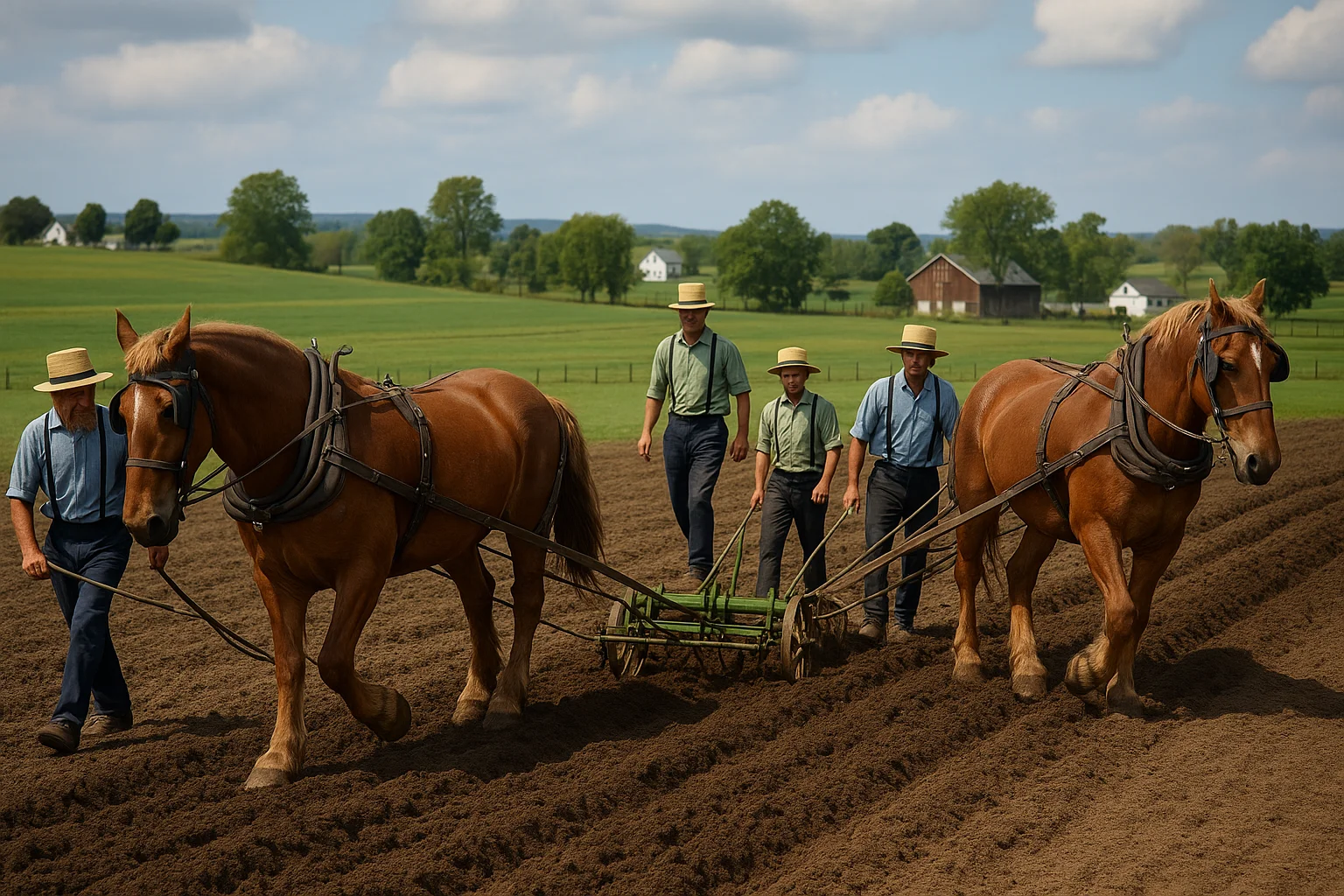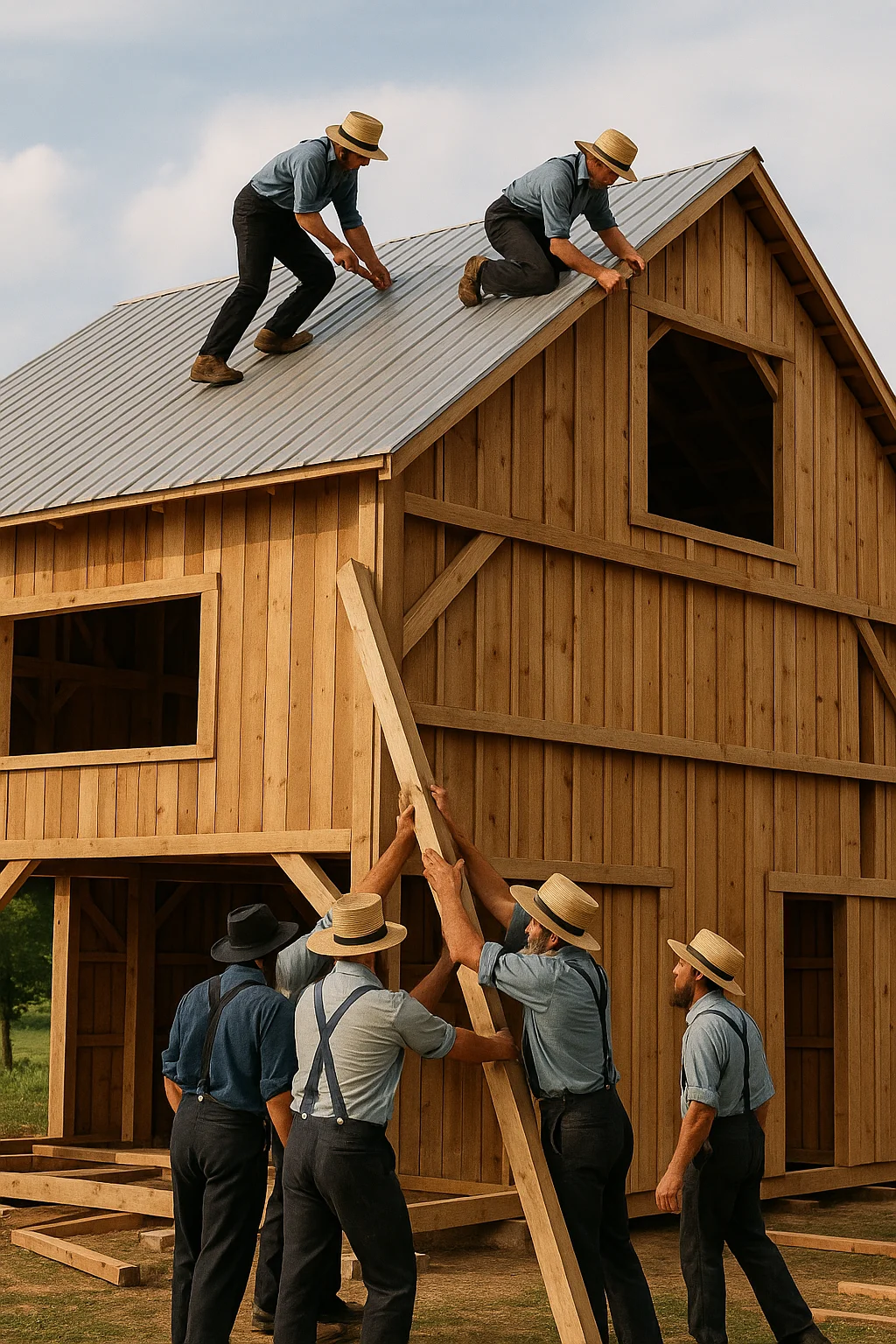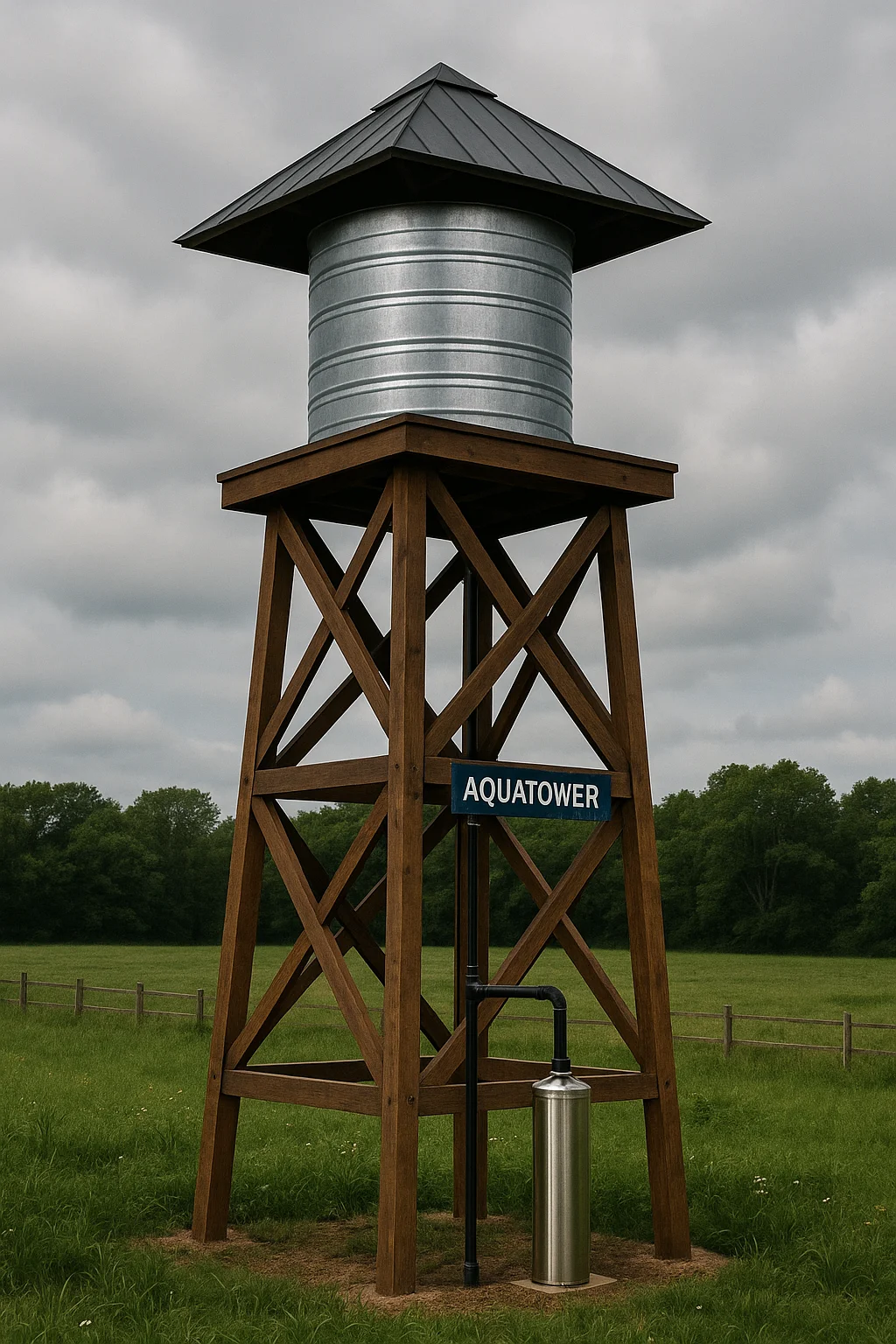🪓 Rediscovering the Amish Skills We Should All Learn
In a world overflowing with convenience and technology, the Amish skills we should all learn are becoming a blueprint for true independence. While most people rely on apps and gadgets to survive daily life, the Amish continue to thrive using methods that are centuries old — yet perfectly suited for today’s uncertain world.
If you’ve ever dreamed of living more self-sufficiently — growing your own food, making your own remedies, or generating your own power — the wisdom of the Amish offers a timeless roadmap. Their traditional skills aren’t just survival techniques; they’re lessons in resilience, purpose, and sustainable living.

👉 For those ready to embrace this lifestyle, start with The Self-Sufficient Backyard — a practical guide that teaches how to build a fully independent homestead using Amish-style principles.
These Amish skills we should all learn go far beyond nostalgia. They offer tangible solutions to modern problems — from food security and rising energy costs to mental burnout caused by technology overload. Let’s explore how these time-honored practices can help you create a simpler, more meaningful, and self-sustaining life.
🕯️ Why the World Is Turning Back to Amish Wisdom
The modern world is fast, noisy, and full of distractions. People chase speed and convenience, yet feel more disconnected than ever. This growing burnout has inspired a cultural shift — a return to simplicity, mindfulness, and Amish skills we should all learn to regain control over our lives.
The Amish live without many modern comforts, yet they’re among the most peaceful and self-sufficient communities in existence. Their days are rooted in purpose — working the land, crafting with their hands, and supporting one another. While the rest of us depend on supply chains and screens, the Amish rely on skill, discipline, and shared values.
These traditional practices are not just “old-fashioned.” They represent a timeless blueprint for survival and sustainability. In a world vulnerable to food shortages, grid failures, and rising costs, many are realizing that living like the Amish — even in small ways — can bring greater peace and stability.
If you’ve ever thought about taking a step toward independence, you’ll find that embracing some of these Amish habits can make all the difference. Their way of life isn’t about rejecting progress; it’s about choosing balance — blending simplicity with purpose.
That’s why so many modern preppers, homesteaders, and families are turning to guides like The Self-Sufficient Backyard — which distills Amish-inspired living into actionable steps for anyone who wants to start small and build lasting self-reliance.
💭 How Amish Simplicity Meets Modern Survival

-
Work ethic over automation: Amish communities value craftsmanship and patience — traits essential for real sustainability.
-
Community-driven resilience: They thrive on cooperation and mutual aid, two qualities that can strengthen any neighborhood or family network.
-
Living by the seasons: Their rhythm of life follows nature, not a digital clock. This simple adjustment can drastically reduce stress and increase productivity.
These foundational ideas show us that simplicity isn’t a weakness — it’s a source of strength. The Amish skills we should all learn help modern people rediscover what truly matters: food security, family connection, and freedom from dependency.
🧰 Core Amish Skills That Build True Independence
The Amish community has preserved a wealth of practical knowledge that’s been passed down for generations — skills that allow them to live comfortably, healthily, and independently without relying on modern systems. These Amish skills we should all learn can be adopted by anyone seeking more control over their life, resources, and future.
🌾 1. Growing and Preserving Food
At the heart of Amish living lies the garden — a year-round source of nourishment and self-reliance. Amish families cultivate fruits, vegetables, and herbs using heirloom seeds and organic methods. They master food preservation techniques like canning, fermenting, drying, and root-cellar storage, ensuring that nothing goes to waste.
For modern households, this practice not only cuts grocery costs but also creates security in uncertain times. Even a small backyard garden or balcony planter can be a powerful first step toward independence.
🌿 Ready to grow your own herbal medicine and food supply? The Medicinal Garden Kit is the perfect place to start — designed for beginners who want to cultivate natural remedies the Amish way.
🪵 2. Carpentry and Homebuilding by Hand
Amish craftsmanship is legendary. They build barns, homes, and furniture entirely by hand, using precision and patience rather than machines. These woodworking skills are rooted in sustainability — they make things to last for generations, not to be replaced every few years.
Even basic woodworking knowledge can help modern homeowners save money, personalize their space, and reduce waste. Whether you’re crafting shelves, repairing a fence, or building a chicken coop, this skill builds resilience and confidence.
For those who want to make their homes more sustainable, The Lost Generator offers an Amish-inspired way to generate electricity off-grid — an invaluable resource when energy systems fail.
🧵 3. Sewing, Quilting, and Clothing Repair
In Amish culture, every garment tells a story. Sewing, mending, and quilting are not hobbies — they’re essential life skills. Instead of discarding worn clothes, Amish women skillfully repair or repurpose them, maintaining a cycle of reuse and respect.
Learning to sew a button, patch jeans, or make simple household items can save hundreds of dollars yearly while promoting sustainable fashion practices. It’s also incredibly rewarding to wear something you’ve made yourself.
🌿 4. Herbal Remedies and Natural Healing
Long before modern pharmaceuticals, the Amish relied on plants and herbs for healing. From echinacea and chamomile to yarrow and comfrey, they’ve perfected the art of herbal medicine.

By understanding basic plant-based remedies, you can handle minor ailments naturally and reduce dependence on store-bought drugs.
💡 Want to build your own herbal apothecary? Grow healing plants with the Medicinal Garden Kit — it includes seeds and instructions for creating a natural medicine cabinet in your backyard.
💧 5. Resourceful Water Management
Amish families are masters of water conservation. They collect rainwater, dig wells, and design efficient irrigation systems — all without electricity. Water is treated as a sacred resource, and every drop is valued.
Modern households can replicate this approach through simple upgrades: rain barrels, greywater recycling, and off-grid purification systems.
For those aiming to secure their water supply, the AquaTower offers a practical, gravity-fed water solution inspired by Amish simplicity.
🍞 6. Food Preservation Without Electricity
Without refrigeration, the Amish rely on traditional methods to store food safely. Root cellars, smoking, fermenting, and drying are just a few techniques that allow them to eat well through every season.
Learning these methods ensures that you can store your harvest or stockpile essentials — even if the power grid fails.
Start building your pantry the Amish way with The Lost Superfoods — a guide to preserving and preparing food like early settlers.
🧭 Why These Skills Matter Today
Each of these Amish skills we should all learn represents a step toward autonomy — the ability to provide for yourself and your family no matter what happens. In a society driven by convenience, rediscovering these timeless techniques could be the difference between dependence and true freedom.
🕊️ Amish Values That Shape Their Skills
Behind every skill the Amish practice lies a core set of timeless values — principles that guide how they work, live, and interact with the world. To truly understand the Amish skills we should all learn, we must first appreciate the mindset that fuels their self-sufficient way of life.
❤️ 1. Simplicity Is Strength
The Amish reject unnecessary complexity. They choose a life free from distractions — no smartphones, no social media, no clutter — focusing instead on what truly matters: family, faith, and honest work.
This simplicity creates mental clarity, stronger relationships, and a deeper sense of peace. When modern people apply this principle — by decluttering, living minimally, or focusing on slow living — they discover an unexpected superpower: freedom from chaos.
“Simplicity is not about deprivation — it’s about intention.”
Start your own simplicity journey by creating a balanced, efficient homestead. A great resource to begin with is The Self-Sufficient Backyard — a guide to building an independent life modeled on sustainable Amish principles.
🤝 2. Community Over Competition
The Amish thrive because of their deep sense of community. Every barn they raise, every quilt they sew, every harvest they bring in — it’s done together. This cooperative mindset transforms labor into fellowship and strengthens their collective resilience.
In today’s world, competition and isolation have become the norm. Reclaiming community spirit — whether through local trade, shared gardens, or neighborhood skill swaps — can rekindle that lost sense of connection.
Their teamwork proves that survival isn’t just about skills; it’s about unity and shared purpose.
To prepare your own family or community for self-reliant living, tools like The Lost Generator make collaboration easier — ensuring your household can thrive off-grid together.
🙏 3. Faith and Purpose in Daily Work
Every task the Amish perform — whether milking cows or weaving baskets — is done with purpose and gratitude. Work isn’t just a necessity; it’s an expression of faith.
This mindset transforms chores into acts of devotion and creates emotional satisfaction that many modern jobs lack. When we bring purpose back into our work, even the simplest tasks take on deeper meaning.
Adopting this spiritual discipline helps cultivate focus, humility, and pride in craftsmanship — traits that enhance every aspect of a self-sufficient life.
🕰️ 4. Patience and Discipline Over Convenience
Amish skills aren’t learned overnight. They require consistency, attention, and perseverance — values that modern life often overlooks. The ability to plant, wait, and harvest is both a physical and spiritual exercise in delayed gratification.
This discipline teaches endurance, which becomes invaluable when facing challenges such as growing your own food or living off the grid.
For anyone embracing these skills, tools like The Lost Superfoods can help you master traditional preservation methods that reward patience and preparation.
🌿 5. Stewardship of the Earth
The Amish see nature as a divine trust — something to nurture, not exploit. They rotate crops, conserve water, and avoid chemical fertilizers. Their respect for the land is what keeps their farms productive for generations.
This stewardship mindset aligns perfectly with modern sustainability movements. Learning to care for the soil, water, and air around you is one of the most crucial Amish skills we should all learn.
To take a step toward ecological responsibility, consider the AquaTower — a water-purifying system that mimics natural filtration and supports sustainable living practices.
💡 Timeless Values for a Modern World
When we combine these values — simplicity, community, purpose, discipline, and stewardship — we unlock a way of life that’s both ancient and revolutionary. The Amish don’t just survive; they flourish because they understand what modern society has forgotten: that real wealth is self-reliance, peace, and belonging.
These are the values that give power to the Amish skills we should all learn, transforming them from survival tactics into a fulfilling, sustainable lifestyle.
🏡 How to Apply Amish Skills in Your Modern Life
Learning the Amish skills we should all learn isn’t about moving to the countryside or giving up electricity — it’s about integrating old-world wisdom into your current lifestyle. By adopting a few simple Amish-inspired habits, you can reduce dependency, increase resilience, and live with more balance and satisfaction.
The Amish lifestyle thrives because it’s built on self-reliance and simplicity — two principles anyone can practice, no matter where they live. You don’t need to abandon technology; you just need to use it with intention.
🌱 1. Start Small with Home Gardening
You don’t need acres of land to grow food the Amish way. A few raised beds or container gardens can yield impressive results. Focus on easy crops like lettuce, tomatoes, and herbs — simple plants that thrive with little effort.
Over time, you’ll develop a deeper connection with the earth and your food supply. Gardening also promotes mental health, lowers grocery bills, and teaches valuable lessons in patience and care.
To make the most of your space, use The Self-Sufficient Backyard — a step-by-step guide to creating a productive, low-maintenance homestead using principles inspired by the Amish.
🧺 2. Practice Repair and Reuse
Before throwing anything away, ask: “Can I repair or repurpose this?” The Amish rarely waste resources. A broken chair becomes firewood, old clothes become quilts, and glass jars become storage containers.
This practice helps you save money, reduce waste, and appreciate craftsmanship. You’ll be surprised how fulfilling it feels to fix something with your own hands instead of buying new.
🔌 3. Generate Your Own Power
Even if you live in the suburbs, you can start producing some of your own energy. Solar panels, small wind turbines, and backup generators offer security and independence from fragile power grids.
When you’re ready to take that next step toward full self-sufficiency, consider The Lost Generator — a simple, reliable system that helps you generate your own electricity off-grid.
🧴 4. Learn Basic Herbal Healing
Modern medicine is vital, but nature offers powerful remedies too. Start by growing common medicinal herbs such as lavender, chamomile, peppermint, and calendula. These plants can soothe everything from headaches to skin irritation.
You don’t need deep knowledge to begin — just curiosity and the right tools. Build your own healing garden with the Medicinal Garden Kit — perfect for beginners looking to grow organic, Amish-style remedies at home.
💧 5. Secure Your Water Supply
Clean water is life. The Amish use wells, rain barrels, and natural filtration systems to ensure consistent water access year-round. You can mirror this practice by installing rainwater collectors, filtration units, or gravity-fed systems.
If you’re looking for an off-grid solution that’s sustainable and simple, check out The AquaTower — a natural purification system that provides clean water without electricity.
🕯️ 6. Live with Purpose, Not Pressure
Perhaps the most valuable of all Amish skills we should all learn is the ability to slow down. The Amish value time, conversation, and craftsmanship over consumption. Taking an hour each day to work with your hands — cooking, gardening, or repairing — reconnects you with the present moment and restores mental clarity.
The simplicity of Amish living teaches us that true wealth isn’t in possessions — it’s in peace of mind, good health, and meaningful work.
💪Take the First Step Toward Your Own Amish-Style Independence
You don’t need to change your entire life overnight. Start small. Grow a few herbs. Fix one broken thing. Reduce waste. And when you’re ready for the next step, let The Self-Sufficient Backyard be your guide — a hands-on manual that helps you live smarter, simpler, and freer.
🛠️ Product Recommendations for Building Your Own Amish Lifestyle
Adopting the Amish skills we should all learn becomes much easier with the right tools and resources. Fortunately, you don’t have to live in rural Pennsylvania to embrace their sustainable lifestyle — modern innovators have recreated many Amish-style systems for today’s homes.
Below, we’ll explore the top products that help you live self-sufficiently, grow your own food, and secure your essentials, using time-tested Amish methods made simple for everyone.
🌿 1. The Self-Sufficient Backyard
Best For: Complete Amish-inspired homesteading
If you want a practical guide that shows exactly how to grow food, generate energy, and manage resources off-grid — The Self-Sufficient Backyard is the perfect starting point.
Created by survival experts who studied Amish systems, this resource helps you:
-
Turn small yards into food-producing gardens
-
Collect and store water naturally
-
Raise chickens and grow herbal medicine
-
Generate your own power without relying on the grid
✅ Best for beginners who want to live simply, save money, and regain independence.
⚡ 2. The Lost Generator
Best For: Off-grid power and emergency backup
Power outages can strike anytime. The Amish rarely notice because their energy independence isn’t dependent on massive grids. For modern households, The Lost Generator offers a simple, efficient system that generates electricity using a small, sustainable setup.
It’s ideal for:
-
Rural homes, cabins, or homesteads
-
Emergency preparedness and survivalists
-
Anyone seeking to reduce their energy bills
⚙️ Quiet, renewable, and built for long-term reliability.
💧 3. The AquaTower
Best For: Water security and purification

Clean, reliable water is the cornerstone of every Amish household. The AquaTower replicates their gravity-based purification methods — no electricity needed.
It’s perfect for:
-
Collecting and purifying rainwater
-
Off-grid or emergency water storage
-
Families seeking chemical-free hydration
💧 Pure, sustainable, and 100% self-reliant.
🥫 4. The Lost Superfoods
Best For: Long-term food storage and preservation
The Amish thrive without modern refrigeration — and you can too. The Lost Superfoods teaches you how to prepare nutrient-dense meals that last for years.
Learn to:
-
Preserve food naturally
-
Store emergency rations safely
-
Recreate historical recipes from the Great Depression
🥕 A must-have for preppers and anyone serious about food security.
🌼 5. The Medicinal Garden Kit
Best For: Natural medicine and healing
Health is wealth — and no one understands that better than the Amish. The Medicinal Garden Kit lets you grow your own backyard pharmacy. It includes seeds and instructions for powerful healing herbs used by generations of Amish families.
You’ll be able to grow:
-
Echinacea for immune support
-
Calendula for skin healing
-
Peppermint for digestion
-
Chamomile for relaxation
🌿 Turn your backyard into a natural healing sanctuary.
📊 Quick Comparison Table
| Product | Best For | Key Benefit | Amish-Inspired Focus |
|---|---|---|---|
| The Self-Sufficient Backyard | Complete homesteading | Full guide to off-grid living | All-in-one manual |
| The Lost Generator | Energy independence | Generates electricity quietly | Off-grid power system |
| The AquaTower | Water management | Clean water without electricity | Gravity filtration |
| The Lost Superfoods | Food preservation | Long-lasting nutrition storage | Traditional food storage |
| Medicinal Garden Kit | Herbal healing | Grow your own medicine | Natural remedies |
💬 Final Thoughts on These Tools
The Amish live by simple, proven systems that create abundance without waste. These products take that same wisdom and adapt it for modern life — whether you live in an apartment, a suburban home, or a remote farm.
By integrating even one or two of these resources, you can reduce dependency, build resilience, and reclaim the satisfaction of true self-reliance.
❓ FAQ: Amish Skills We Should All Learn
🧵 1. What skills do the Amish have?
The Amish possess a wide range of self-sufficiency skills that most modern people have forgotten. These include farming, food preservation, woodworking, sewing, herbal medicine, and animal husbandry. They build their own homes, repair their tools, and grow everything they eat.
Their traditional approach to life has helped them thrive without dependence on modern infrastructure — something many people today are trying to replicate through homesteading and off-grid living.
If you want to start developing similar skills, check out The Self-Sufficient Backyard — a complete blueprint for living independently using proven Amish-style methods.
🌾 2. What are 5 practices all Amish have in common?
While different Amish communities vary slightly, these five core practices unite them all:
-
Faith and Discipline: Every aspect of life is guided by religious values and daily structure.
-
Simplicity: The Amish value humility, modesty, and living with only what’s necessary.
-
Community: They thrive on cooperation — working together for mutual success.
-
Hard Work: From dawn to dusk, they engage in purposeful, productive labor.
-
Self-Reliance: They build, grow, and create everything they need to survive and prosper.
These principles are exactly what make the Amish skills we should all learn so transformative for modern families seeking stability and independence.
❤️ 3. Can Amish use condoms?
No, the Amish traditionally do not use condoms or modern birth control. Their faith emphasizes natural family planning and views children as blessings from God. While not all communities are identical in their interpretation, most Amish families prefer to follow traditional methods in keeping with their belief system.
This highlights their consistent value system — one rooted in simplicity, faith, and living close to nature.
👩🌾 4. How many wives do the Amish have?
The Amish practice monogamy, meaning one man has one wife. Polygamy is not part of Amish beliefs or lifestyle. Their marriages are deeply rooted in Christian tradition, emphasizing loyalty, family, and partnership.
Amish couples typically marry young and stay together for life, embodying strong commitment and shared purpose — qualities that support their sustainable, self-reliant way of living.
🌅 Rediscovering Balance Through Amish Wisdom
As the world races forward, more and more people are realizing that progress without purpose leads to emptiness. The Amish skills we should all learn are not just quaint traditions — they’re a survival map for modern times.
These simple yet powerful practices remind us that true wealth isn’t measured by money or convenience, but by the ability to live independently, peacefully, and with intention. The Amish have mastered the art of enough — growing what they need, working with their hands, and cherishing community over consumption.
By adopting even a few of these skills — gardening, repairing, herbal healing, or sustainable building — you reconnect with the earth and rediscover self-reliance. You’ll eat healthier, waste less, and feel more grounded than ever before.
🪴 Whether you live in a city apartment or a country cottage, these lessons can transform your daily life into something deeply fulfilling and secure.
For a practical way to start this journey, the The Self-Sufficient Backyard offers a full blueprint to build your own modern Amish-style homestead — complete with off-grid water, food, and energy systems.
If your goal is to become more resilient and resourceful, also consider these powerful tools:
-
🔋 Generate your own energy with The Lost Generator
-
💧 Secure clean water with The AquaTower
-
🥫 Preserve your food supply using The Lost Superfoods
-
🌿 Grow natural medicine with The Medicinal Garden Kit
Each product echoes the core principle of the Amish lifestyle — self-reliance with purpose.
The time to reclaim that wisdom is now. Don’t wait for uncertainty to remind you how fragile convenience really is. Start small. Live simply. And embrace the quiet power of the Amish skills we should all learn — because in simplicity, there’s true freedom.

